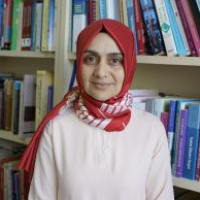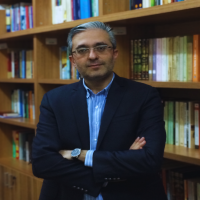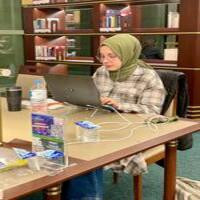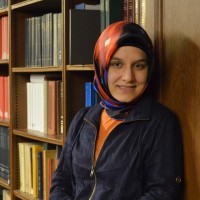Research Article
Research Note
Book Review
Issue Editorial Board

Born in 1989 in Kayseri. He graduated from Marmara University Faculty of Economics and Administrative Sciences in 2011. He completed his master's degree at Ankara University Institute of Social Sciences, Department of Tafsir in 2014. He completed his doctorate at Atatürk University, Institute of Social Sciences, Department of Islamic History and Arts in 2023. He worked as a research assistant at the Faculty of Theology of the same university between 2015-2023. Currently, he continues to work as a doctoral faculty member in the Department of Islamic History at the same faculty.
Translated with DeepL.com (free version)

Hi
I'm Abdulvahap Kösesoy and I am a research assistant at Marmara University. My specialty is the history of the Qur'an.

Professor Ayman Shihadeh is an intellectual historian of the Islamic world, whose research focuses on the history of theology, philosophy and wider intellectual and religious culture.
After receiving a first-class BA (Hons) from SOAS, he completed his postgraduate studies at the University of Oxford in 2002, and then taught at the Universities of Edinburgh, Exeter and Glasgow before joining SOAS in 2008. He was awarded the Senior Humanities Research Fellowship at New York University Abu Dhabi for two years, between 2019-2021.
His main areas of research interest include the history of systematic theology, the Avicennan philosophical tradition, and the interaction between philosophy and religious thought in the pre-modern Islamic world. He is interested in the thought, especially in metaphysics, epistemology, ethics, anthropology and dialectical practices, as well as the sources and wider environments in which thought developed and was transmitted and contested.
His publications include several books, including two monographs, the first on the ethical theory of the influential theologian-cum-philosopher Fakhr al-Din al-Razi (d. 1210), and the second on the little-studied 12th-century philosopher Sharaf al-Din al-Mas‘udi, as well as studies on Avicenna (d. 1037), al-Ghazali (d. 1111), Ash‘arism and Mu‘tazilism.







1986 yılında Ankara'da doğdu. Orta öğrenimini Ankara Tevfik İleri Anadolu İmam-Hatip Lisesi'nde 2004 yılında tamamladı. 2008 yılında Ankara Üni. İlahiyat Fakültesi'nden mezun oldu. 2009 yılında Ankara Üni. İlahiyat Fak. İslam Hukuku Anabilim Dalı'nda araştırma görevlisi olarak göreve başladı. 2011 yılında yüksek lisansını, 2017 yılında ise doktorasını tamamladı. Doktora sonrası çalışmalarını İlm-i Hilaf alanında yoğunlaştırmıştır. Halen aynı kurumda Dr. Öğr. Üyesi olarak görevine devam etmektedir.





Aim & Scope
The Journal of the Faculty of Divinity of Ankara University (Ankara Üniversitesi İlahiyat Fakültesi Dergisi - AUIFD) is an international, peer-reviewed open-access academic journal published twice a year (on May 31 and November 30). Established in 1952, it served as the sole academic journal in the field of Islamic and religious studies (ilahiyat) in Türkiye for an extended period. AUIFD is one of the most respected journals in its field.
The primary objective of the journal is to present qualified and original studies conducted in the field of Islamic and religious studies (ilahiyat) to academic communities, thereby facilitating the production and dissemination of scholarly knowledge. In this context, AUIFD aims to evaluate the accumulated knowledge in the field from past to present, to refine and develop it when necessary, and to support the development of new scholarly approaches and problematics.
AUIFD accommodates all forms of academic knowledge as long as they align with the publishing principles established and announced on its platform. Within this framework, it evaluates various types of studies, including research articles, research notes, interviews, book or scientific meeting reviews, and tributary notes.
AUIFD assesses studies conducted in Turkish, English, and Arabic on specific topics within the fields of Humanities and Social Sciences. These topics are as follows:
Humanities: Religion (Qur’anic Exegesis, Hadith, Kalam, Islamic Jurisprudence, Sufism), Philosophy (Islamic Philosophy, Philosophy of Religion, History of Philosophy, Logic), History (History of Religions, Islamic History, History of Islamic Sects, History of Islamic Arts), Literature (Islamic Literature, Arabic Language and Rhetoric), Music (Turkish Religious Music).
Social Sciences: Psychology (Psychology of Religion), Sociology (Sociology of Religion), Education (Religious Education).
Author Guidelines
The Journal of the Faculty of Divinity of Ankara University (AUIFD) is an open-access academic journal that conducts plagiarism checks, preliminary evaluations, double-blind peer reviews, and editorial review processes.
• Submissions are accepted in Turkish, English, and Arabic.
• Articles are expected to be related to at least one subfield of Islamic and religious studies.
• The journal publishes works in the following categories: Research Articles, Research Notes, Book Reviews, Scientific Conference Reviews, Interviews, and Tributary Notes.
• Authors submitting to each category must adhere to the points outlined on the Article Categories and Processing Workflow page.
• AUIFD is published twice a year (May 31 and November 30). Articles in the Research Article category must be submitted four months prior to the publication date (by January 31 for the May issue and by July 31 for the November issue). Submissions in other categories must be sent two months before the publication date (by March 31 for the May issue and by September 30 for the November issue). The submission system open for article submissions from December 15 to January 31 and from June 15 to July 31. After the submission period ends, authors wishing to submit to categories other than Research Articles must contact the journal at iladergi@ankara.edu.tr.
• Articles not completing the peer review or editorial review processes by the publication date will be deferred to the next issue.
• All submissions undergo a plagiarism check using iThenticate during the initial submission phase. A similarity rate below 20% is expected. If similarity exceeds 20%, the Editorial Board will evaluate the report's validity.
• All Research Articles undergo preliminary evaluation (approximately 3 weeks) and peer review (approximately 30 days, though delays due to reviewers are possible). Editorial reviews take approximately 30 days.
• Submissions in categories other than Research Articles are subject only to editorial review processes.
• All submitted works, in whole or in part, must not have been published elsewhere or simultaneously submitted for publication elsewhere. Authors are required to read the journal’s Publication Ethics and Publication Malpractice Statement.
• Multiple Research Articles by the same author cannot be published in a single issue. However, it is possible to publish multiple works by the same author in different categories, subject to the decision of the Editorial Board.
• Editorial Board members must comply with the same publication processes as other contributors.
• The AUIFD follows the CMOS 18th edition (The Chicago Manual of Style) for referencing, with adaptations for Turkish. Submissions must be prepared according to the AUIFD Publication Guide, written in Microsoft Office Word using Cambria font size 11 (for Arabic articles, use Sakkal Majalla font size 12) with 1.5 line spacing, saved with a .doc or .docx extension, and all text including headings should be defined as “normal text.”
• A full transliteration system is applied in AUIFD. Therefore, after peer review, transliteration must be performed according to the AUIFD Publication Guide. For English articles, English titles and English abstracts of all articles AUIFD follows the IJMES Translation and Transliteration Guide rules for words requiring transliteration.
• All articles must include a bibliography listing all cited works. For Arabic articles, a Latin-script bibliography is mandatory.
• Research Articles and Research Notes must include an abstract of 200-250 words and 5-7 keywords in both Turkish and English, covering the article’s purpose, problem, original contribution to the literature, methodology, and results.
• Research Articles should be 5,000 to 11,000 words. If the word count is below or above these limits, the Editorial Board’s evaluation will be decisive.
• The author’s name or identifying information must not appear in the manuscript (including self-references in footnotes). Such information may be added to the revised manuscript after peer review.
• Articles derived from graduate theses must list the student as the first author and the supervisor as the second author.
• Submissions must include a separate Word document with the following information:
o Title of the article
o Author’s full name
o Institutional affiliation
o Phone number
o Correspondence address (including postal code)
o Email address
o ORCID number
o If derived from a graduate thesis or conference paper, the corresponding citation information.
o Contribution rates of each author (for multi-author submissions)
o If there is financial support for the study, a declaration of this support
o For articles requiring ethics committee approval, include the name of the institution that provided the approval, along with the decision number and date.
o Declaration of artificial intelligence (AI) usage: “No AI-assisted technologies were used in the preparation of this study." or “AI-assisted technologies were used in the … stage(s) (e.g., translation, language editing, analysis, data visualization, summarization, literature review, etc.) of this study.”
Ethical Principles and Publication Policy
RESPONSIBILITIES OF THE PUBLISHER AND THE EDITORIAL BOARD
Publication Principles
AUIFD is a semiannually published peer-reviewed academic journal published twice a year, with publication dates on May 31 and November 30.
The final decision regarding the publication of manuscripts submitted to AUIFD is made by the Editorial Board.
Submissions in categories other than Research Articles are subject only to editorial review processes.
RESPONSIBILITIES OF REVIEWERS
Contribution to the Editorial Decision-Making Process
RESPONSIBILITIES OF AUTHORS
Reporting Standarts
Articles derived from graduate theses must list the student as the first author and the supervisor as the second author.
Ethical Statements
Disclosure and Conflict of Interest
• Articles are expected to be related to at least one subfield of Islamic and religious studies.
Price Policy
AUIFD does not charge any article submission, article-editorial processing or publication charges.
Authors publishing with the journal retain the copyright to their work licensed under the Creative Commons Attribution-NonCommercial 4.0 International license (CC BY-NC 4.0) (https://creativecommons.org/licenses/by-nc/4.0/ ) and grant the Publisher non-exclusive commercial right to publish the work. CC BY-NC 4.0 license permits unrestricted, non-commercial use, distribution, and reproduction in any medium, provided the original work is properly cited.

AUIFD is licensed under a Creative Commons Attribution-NonCommercial 4.0 International License.








